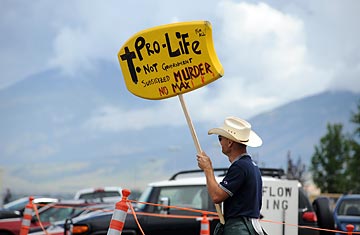
Montana residents protest outside a town-hall meeting held by President Obama in a hangar at Gallatin Field Airport
(2 of 2)
Nonetheless, the new system differs markedly from the old federal policy of not involving the government in abortion services unless issues of rape, incest or the life of the mother are at play. "It does represent a policy shift in favor of the abortion-rights community that it would not have received under George W. Bush's Administration," says Glen Halva-Neubauer, a political scientist at Furman University who has studied the politics of abortion.
For supporters of abortion, the House bill offers a neat compromise, which they describe as a continuation of the status quo, allowing the federal role in health care to expand without significantly changing the offerings in the private marketplace. "[American consumers] get to choose which plan they want," says Shipp of NARAL. "They get to choose a plan without abortion."
But for opponents of abortion, including a number of House Democrats, the proposal represents a major reversal of a decades-old policy of keeping the Federal Government out of the abortion business. In a recent letter to members of Congress, the United States Conference of Catholic Bishops called the House proposal a "radical change" built around the "illusion" that public funds could be segregated from private funds in a government-run plan or in private plans that accept federal subsidies. "Funds paid into these plans are fungible, and federal taxpayer funds will subsidize the operating budget and provider networks that expand access to abortion," writes Cardinal Justin Rigali in an Aug. 11 letter to members of Congress.
For Stupak, the pro-life Democrat, the battle over abortion in health-care reform is certain to continue when Congress returns from recess. "We are going to do everything we can to stop the rule, or the bill, from coming to the floor," Stupak says, adding that as many as 39 Democratic members of Congress may join him in the effort. It remains unclear how the Senate will deal with the abortion issue. There is also no consensus within the Democratic Party about whether a public option should be included in final health-care-reform legislation.
In the meantime, Stupak says that Obama's statements during recent public events signal one of two things: either he does not fully understand the current House bill, which Stupak maintains has the effect of publicly funding abortion, or "if he is aware of it, and he is making these statements, then he is misleading people."
